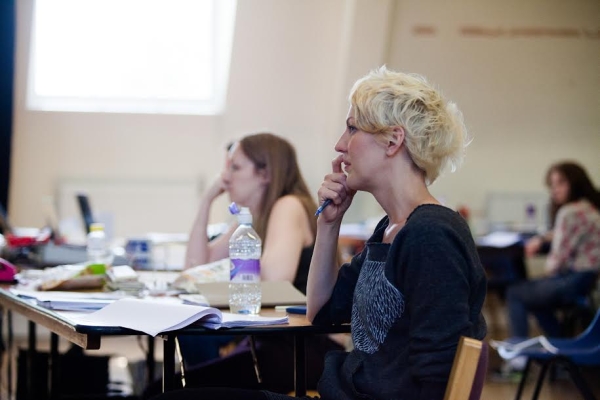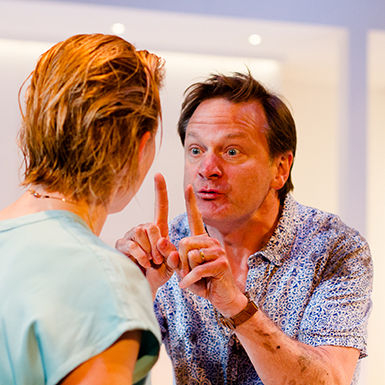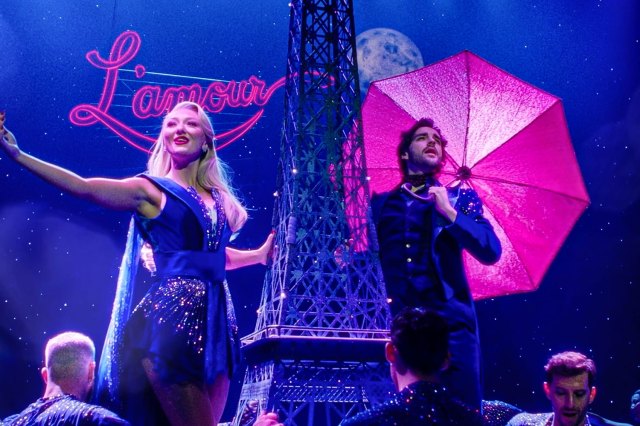Director Maria Aberg: 'We have a responsibility to consider gender-blind casting'
The ”Hotel” director is returning to the RSC to helm a radical reinterpretation of John Webster’s ”The White Devil”

© Kwame Lestrade
Director Maria Aberg, who is just starting rehearsals for her latest RSC show, almost thwarted her chances of working with the company at all. As we chat at the National Theatre, she is recalling an interview for an assistant director job she had several years ago which was "absolutely dreadful". "It was the worst interview ever," Aberg says, still wincing slightly at the memory. "And I remember walking out thinking 'totally never going to work there'."
While Aberg might not have got that assisting job, she was wrong about her future with the RSC. After directing two new plays for the company – Roy Williams' Days of Significance and Dennis Kelly's The Gods Weep – she tackled her first Shakespeare, King John, two years ago, followed up by a popular As You Like It last summer. This year, she is part of the 'Roaring Girls' line-up with her production of John Webster's bloody revenge tragedy The White Devil.
Aberg's first encounter with Shakespeare at the RSC, she tells me, was liberating and at times dismaying. Directing a lesser known Shakespeare, to which many audiences would be arriving fresh, allowed Aberg and her team to be "completely irreverent and really playful with it". Aberg's King John exploded with pop cultural references, from Rihanna to Dirty Dancing, while she strikingly reimagined the Bastard as a woman. For some, however, this inventiveness of approach was not welcome; reviews ranged from admiring raves to dismissive complaints about Aberg's perceived iconoclasm.
"I think what surprised me – because I had never really done it before – was that if you use lots of pop cultural references in the way that we used them, which was in a way highlighting two-dimensionality and simplicity of them as cultural expressions, that the criticism that was levelled was that we were doing something two-dimensional and facile."
"Because we made it look glossy and hollow and kind of loud and brash, they didn't appreciate that was a choice and a reference," Aberg adds. "That was a bit of a sad discovery."
The experience did not, however, put Aberg off directing Shakespeare. She puts her interest in the Bard's plays down to the fact that they are "written in a tradition that only relies on language to convey theatricality" and are therefore "open to interpretation in a completely different way to a lot of 20th and 21st century plays". Continuing in this vein of interpretation, Aberg's As You Like It located the Forest of Arden in a joyously anarchic music festival setting, while her Much Ado About Nothing at the Royal Exchange sent sparring lovers Beatrice and Benedick travelling through time from the 1940s to the late 60s.
One theme that was explored in that latter production, and that is just as important to Aberg's working practice as her artistic choices, is the issue of gender equality. "I'm a feminist and I think that affects everything I do and it's important to me that it does," she explains. As we discuss, gender imbalance is still rife in theatre, and Aberg is determined to do what she can to challenge it. Especially when working with the classical repertoire, she argues, it is something that directors and theatres have to be thinking about.
"I think we have a responsibility as theatre-makers to consider gender-blind casting as much as we consider colour-blind casting," Aberg insists. "I just think it's really basic." Gender switching has been an integral element of her Shakespeare productions, although she is keen to add that "there's also an artistic reason for doing it that comes from inside each concept or each production in a different way".
In Aberg's production of The White Devil, a central re-gendering promises to be the key to the play's sexual politics. The powerful and manipulative figure of Flamineo will be played as a woman in this production, allowing Aberg to highlight the misogyny of Webster's world and "analyse how a female character might have taken on that oppressive system and internalised it". It is, she hopes, a choice that will have resonance for modern audiences: "I feel like it's a really dangerous trap that faces women today of trying to play the man's game and thinking that is going to change things".
Change is at the heart of the Roaring Girls programme, of which The White Devil is a part. Coordinated by the RSC's deputy artistic director Erica Whyman, the season of Jacobean plays offers strong roles for women and puts the question of gender inequality in theatre centre stage. Over the summer, meanwhile, the Midsummer Mischief festival will be both pushing against and entering into a dialogue with the work in the Swan Theatre, responding to the provocation (borrowed from historian Laurel Thatcher Ulrich) that "well-behaved women seldom make history".
"I think Erica's done a fantastic job in putting all of that together," says Aberg, though she does issue a note of caution. "I feel like we have to be careful to not make female heavy or gender political work niche. I don't think what's happening at the RSC at the moment runs the risk of that, but there can be a sense of that actually heightening the sense of other – that there is mainstream work that is by and large made by men, and then on the fringes of it every now and again pops up a sort of exception which is more female heavy."
Alongside investigating the gender politics of the play, Aberg is interested in the theme of presentation in The White Devil: "how you present your gender and how you present your religion and how you present your politics". Her production promises to bring these questions right up to date, situating the play in a "relatively abstract" contemporary world and bringing on board Django Django to compose the soundtrack. While there will inevitably be challenges involved in updating Webster's play, Aberg is not daunted. "I think it would be more difficult to do a historically accurate production of it," she suggests. "And a lot less exciting."
'Bravely different'
While Aberg works on The White Devil at the RSC, the other side of her career as a director – working on new plays – can be seen showcased in the National Theatre's temporary space (formerly known as The Shed), where she has directed Polly Stenham's new play Hotel, a "tropical thriller" set on a desert island. Aberg describes the process as "pure collaboration", which she enjoys as a contrast to directing classics. "It's very different and also not very different at the same time," she reflects. She adds that there is no particular approach that she brings to each of her projects – "just read it, panic, and read it again".

© Kwame Lestrade
Aberg won't be drawn into sharing any details about the plot of Hotel, which she and Stenham are trying to keep quiet, but she enigmatically tells me that the play is about "responsibility and accountability and action and consequence, and what implications your actions can have on a personal level and a social level". She sees continuity between this play and Stenham's previous work, but says that Hotel is "quite bravely different in lots of ways".
While sitting in the National Theatre and discussing Aberg's work both there and at the RSC, major theatre institutions are a natural topic of conversation. Much of Aberg's directing work has been within the walls of such institutions, as well as a stint as a senior reader at the Royal Court, where she claims she learned "everything I know about plays and structure and dramaturgy". Alongside all of their advantages, are there any restrictions to making theatre in these environments?
"I never really have a sense of what you can't do," Aberg says. "I don't ever really feel like I've been told that this is where your creativity finishes. What you can do is you can rehearse for long periods of time – sometimes very long periods of time – and enjoy the support of a really well funded production department."
Aberg also has experience of working abroad, both in her native Sweden and in Germany. Although she trained in Britain and considers herself more as a British than a European director, Aberg sees definite advantages to working overseas. "Experience is always going to be good, is always going to widen your perspective, is always going to add something – even if it's a sense of what you don't want to do or what you don't want to make."
Others have identified Aberg as part of a generation that is pushing at the status quo in British theatre. Surveying the current landscape, Aberg certainly sees signs of change, pointing to the example of Secret Theatre at the Lyric Hammersmith. "I don't think that would have happened ten years ago," she suggests. "It's just a small group of people thinking that it's possible and wanting to do something that's different and a bit daring and a bit deliberately provocative. And that feels really exciting."
At the same time, however, Aberg recognises that each new generation has an impulse to shake up what has gone before. It is an impulse that she certainly shares. "I think that is the job of every generation. If we failed at doing that we'd be terrible."
The White Devil is at the RSC Swan Theatre from 30 July to 29 November. Hotel continues at the National Theatre until 2 August.












